-
In the Weekly Address this morning, President Obama explains how the budget he sent to Congress will fulfill the promises he made as a candidate. On fiscal responsibility, a fair tax code, a clean energy economy, real health care reform, and education, this budget sets out a new vision for our country.
But having put his priorities on paper and having stood behind them, the President recognizes that there are those who will fight against change every step of the way.
"I realize that passing this budget won’t be easy. Because it represents real and dramatic change, it also represents a threat to the status quo in Washington. I know that the insurance industry won’t like the idea that they’ll have to bid competitively to continue offering Medicare coverage, but that’s how we’ll help preserve and protect Medicare and lower health care costs for American families. I know that banks and big student lenders won’t like the idea that we’re ending their huge taxpayer subsidies, but that’s how we’ll save taxpayers nearly $50 billion and make college more affordable. I know that oil and gas companies won’t like us ending nearly $30 billion in tax breaks, but that’s how we’ll help fund a renewable energy economy that will create new jobs and new industries. I know these steps won’t sit well with the special interests and lobbyists who are invested in the old way of doing business, and I know they’re gearing up for a fight as we speak. My message to them is this:"So am I."
Watch the full address and read the transcript below.
Remarks of President Barack Obama
Weekly Address
Saturday, February 28th, 2009
Washington, DCTwo years ago, we set out on a journey to change the way that Washington works.
We sought a government that served not the interests of powerful lobbyists or the wealthiest few, but the middle-class Americans I met every day in every community along the campaign trail – responsible men and women who are working harder than ever, worrying about their jobs, and struggling to raise their families. In so many town halls and backyards, they spoke of their hopes for a government that finally confronts the challenges that their families face every day; a government that treats their tax dollars as responsibly as they treat their own hard-earned paychecks.
That is the change I promised as a candidate for president. It is the change the American people voted for in November. And it is the change represented by the budget I sent to Congress this week.
During the campaign, I promised a fair and balanced tax code that would cut taxes for 95% of working Americans, roll back the tax breaks for those making over $250,000 a year, and end the tax breaks for corporations that ship our jobs overseas. This budget does that.
I promised an economy run on clean, renewable energy that will create new American jobs, new American industries, and free us from the dangerous grip of foreign oil. This budget puts us on that path, through a market-based cap on carbon pollution that will make renewable energy the profitable kind of energy; through investments in wind power and solar power; advanced biofuels, clean coal, and more fuel-efficient American cars and American trucks.
I promised to bring down the crushing cost of health care – a cost that bankrupts one American every thirty seconds, forces small businesses to close their doors, and saddles our government with more debt. This budget keeps that promise, with a historic commitment to reform that will lead to lower costs and quality, affordable health care for every American.
I promised an education system that will prepare every American to compete, so Americans can win in a global economy. This budget will help us meet that goal, with new incentives for teacher performance and pathways for advancement; new tax credits that will make college more affordable for all who want to go; and new support to ensure that those who do go finish their degree.
This budget also reflects the stark reality of what we’ve inherited – a trillion dollar deficit, a financial crisis, and a costly recession. Given this reality, we’ll have to be more vigilant than ever in eliminating the programs we don’t need in order to make room for the investments we do need. I promised to do this by going through the federal budget page by page, and line by line. That is a process we have already begun, and I am pleased to say that we’ve already identified two trillion dollars worth of deficit-reductions over the next decade. We’ve also restored a sense of honesty and transparency to our budget, which is why this one accounts for spending that was hidden or left out under the old rules.
I realize that passing this budget won’t be easy. Because it represents real and dramatic change, it also represents a threat to the status quo in Washington. I know that the insurance industry won’t like the idea that they’ll have to bid competitively to continue offering Medicare coverage, but that’s how we’ll help preserve and protect Medicare and lower health care costs for American families. I know that banks and big student lenders won’t like the idea that we’re ending their huge taxpayer subsidies, but that’s how we’ll save taxpayers nearly $50 billion and make college more affordable. I know that oil and gas companies won’t like us ending nearly $30 billion in tax breaks, but that’s how we’ll help fund a renewable energy economy that will create new jobs and new industries. In other words, I know these steps won’t sit well with the special interests and lobbyists who are invested in the old way of doing business, and I know they’re gearing up for a fight as we speak. My message to them is this:
So am I.
The system we have now might work for the powerful and well-connected interests that have run Washington for far too long, but I don’t. I work for the American people. I didn’t come here to do the same thing we’ve been doing or to take small steps forward, I came to provide the sweeping change that this country demanded when it went to the polls in November. That is the change this budget starts to make, and that is the change I’ll be fighting for in the weeks ahead – change that will grow our economy, expand our middle-class, and keep the American Dream alive for all those men and women who have believed in this journey from the day it began.
Thanks for listening. -
OMB Director Peter Orszag is up again on his new blog, this time addressing the questions on how the budget will affect deductions for charitable contributions ("Is our budget proposal uncharitable?") Again, very much worth reading in full.
The EPA has video of the First Lady’s visit from yesterday. Also chime in on their Question of the Week: How has your community used smart growth for environment-friendly development?
The State Department also has their question of the week up: "What Is the Best Path Forward for Gaza?" It's accompanied by the picture below:
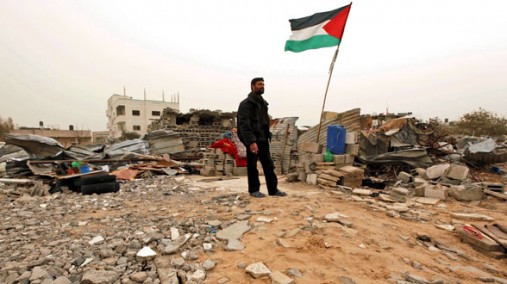
DOT gets underway on Expressions of Interest on high-speed rail.
In case you missed it in today’s scrappy live-blog, Housing Secretary Shaun Donovan and Energy Secretary Steven Chu today announced a major partnership between their departments that will use $16 billion in funds from the ARRA to help create green jobs.
Talk to any career web professional in the federal government long enough, and sooner or later the TSA’s blog comes up. Vent your traveling frustrations; they might even fix it – really.
-
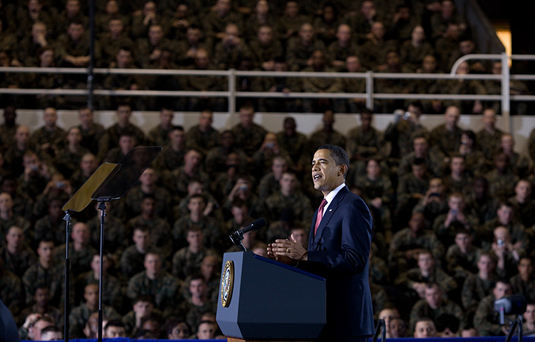
"Let me say this as plainly as I can: by August 31, 2010, our combat mission in Iraq will end," the President said today at Camp Lejeune, North Carolina.
"I want to be very clear," the President said. "We sent our troops to Iraq to do away with Saddam Hussein’s regime – and you got the job done. We kept our troops in Iraq to help establish a sovereign government – and you got the job done. And we will leave the Iraqi people with a hard-earned opportunity to live a better life – that is your achievement; that is the prospect that you have made possible."
Though he and the nation's civilian and uniformed leaders have established a clear timeline for withdrawal, the President emphasized that many challenges remain:
But let there be no doubt: Iraq is not yet secure, and there will be difficult days ahead. Violence will continue to be a part of life in Iraq. Too many fundamental political questions about Iraq’s future remain unresolved. Too many Iraqis are still displaced or destitute. Declining oil revenues will put an added strain on a government that has had difficulty delivering basic services. Not all of Iraq’s neighbors are contributing to its security. Some are working at times to undermine it. And even as Iraq’s government is on a surer footing, it is not yet a full partner – politically and economically – in the region, or with the international community.
The President ordered the review that led to this decision on his first day in office, and considered options for moving forward that reflected input from military commanders, the Joint Chiefs, Secretary Gates, and his national security team. Read the entire speech to see the details of the plan.
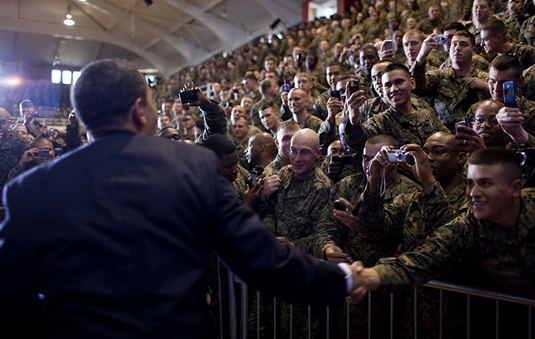
White House photos 2/27/09 by Pete Souza
-
The Vice President and his team are in Philadelphia this morning for the first meeting of the Middle Class Task Force, and it's all about how green jobs -- jobs that help us move towards a growing, greener, cleaner economy -- can be an aid to the middle class.He makes the case in an op-ed appearing this morning in the Philadelphia Inquirer.Today's event should be really interesting. The Task Force is going to be meeting with the people who know this field the best -- the policy makers and entrepeneurs and advocates who are working together to figure out how to grow our economy and do what’s right for the environment at the same time, while making sure the middle class benefits.We're going to be liveblogging the event over at AStrongMiddleClass.gov -- thanks to Greg Nelson from the Office of Public Liaison, who's attending the meeting -- so check back throughout the day.
-
- Education Secretary Duncan highlights changes to student aid in the budget, following on OMB Director’s theme of simplification.
- The Chicago Bulls were at the White House today to present the 44th President -- and proud Chicagoan -- a custom jersey. Pictures below.
- The Vice President met at the White House with President Fatmir Sejdiu of Kosovo.
- Yesterday Secretary of State Clinton released the Country Reports on Human Rights Practices for 2008, watch the video.
- Check out photos of the Department of Labor welcoming Hilda Solis.
- Read DHS Secretary Napolitano’s confirmation testimony.
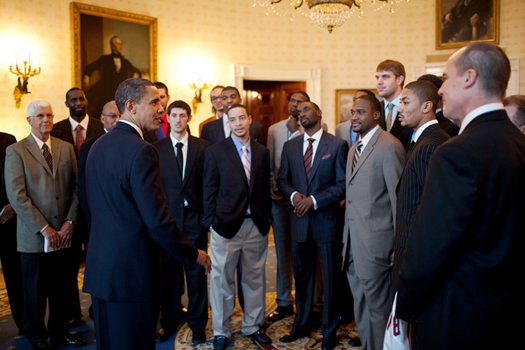
President Barack Obama with members of the Chicago Bulls basketball team Thursday, Feb. 26, 2009, in the Blue Room at the White House. (White House photo 2/26/09 by Pete Souza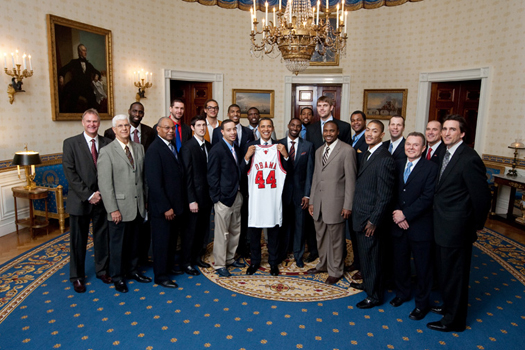
The 44th President holds up a custom jersey alongside members of the Chicago Bulls basketball team Thursday, Feb. 26, 2009, in the Blue Room at the White House. (White House photo 2/26/09 by Joyce N. Boghosian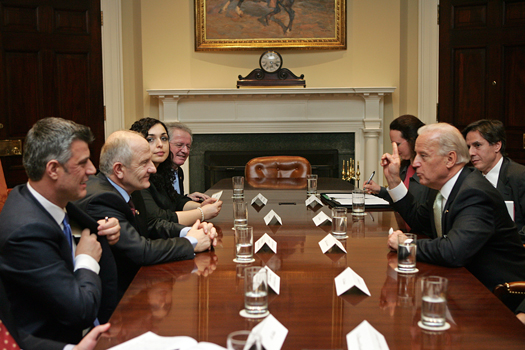
Vice President Joe Biden, right, meets with President Fatmir Sejdiu of Kosovo, second from left, in the Roosevelt Room of the White House Thursday, Feb. 26, 2009. (White House Photo 2/26/09 by Sharon Farmer -
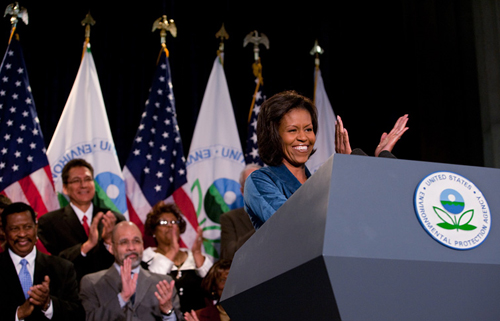
First Lady Michelle Obama applauds the staff members at the Environmental Protection Agency Thursday morning, Feb. 26, 2009, thanking them for their work during her visit to the EPA headquarters in Washington, D.C.Along with thanks and congratulations, First Lady Michelle Obama today appealed to employees of the Environmental Protection Agency to strive for excellence for the sake of the next generation."I've often spoken about my most important job -- being a mom -- and like mothers and fathers everywhere, the health and safety of our children is our top priority," the First Lady said on a visit to EPA headquarters. "This is what it is all about: the future. And in many ways, it starts with all of you. You ensure that the water we drink is safe, that the air we breathe is clean, and that the polluted fields and abandoned factories in our neighborhoods all over this nation are cleaned up and restored."
Hundreds of employees turned out to see the First Lady, whom EPA administrator Lisa Jackson introduced as "an icon" of grace, class and style. And some took heart in what the First Lady assured them would be "a new day" at the EPA.
"We are just thrilled to be working for an administration that respects the work we do, environmental work but public service more specifically," said Beth Hall, who works in the ground water and drinking water office (pool report).
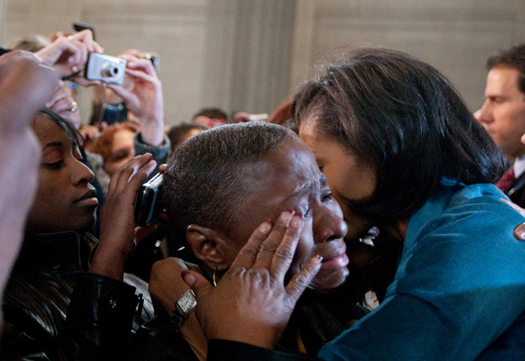
A staff member wipes away tears as she meets First Lady Michelle Obama at the Enivironmental Protection Agency Thursday morning, Feb. 26, 2009, where Mrs. Obama thanked the employees for their hard work during her visit to the EPA headquarters in Washington, D.C. (White House photos 2/26/09 by Joyce N. Boghosian) -
If you’re interested in applying for a White House internship, the application process is now open.Applications are due March 22, 2009. A couple of important things to keep in mind:In addition to normal office duties, interns will supplement their learning experience by attending a weekly lecture series hosted by senior White House staff, help at White House social events, and volunteer in community service projects.White House Internships are unpaid positions and participants are responsible for arranging their own transportation and housing for the duration of the program.
-
"I think it’s fair to say that had I not been a Stevie Wonder fan, Michelle might not have dated me. We might not have married. The fact that we agreed on Stevie was part of the essence of our courtship," President Obama said last night at a White House ceremony presenting the singer with the 2nd annual Gershwin Award for Lifetime Achievement from the Library of Congress.
The First Lady echoed her husband's sentiments.
"Tonight it is a huge thrill for me as we honor a man whose music and lyrics I fell in love with when I was a little girl," she said. "Years later, I discovered what Stevie meant when he sang about love. Barack and I chose the song, ‘You and I’ as our wedding song."
An all-star lineup of singers performed some of Wonder's biggest hits, including Tony Bennett, Diana Krall, Will.i.am, and Paul Simon (who won the first Gershwin Award last year).
"I accept this in memory of my mother. I know that Lula Mae is smiling right now," Wonder said. "And Mr. President, I know that if she were here, she'd say, let me get him a peach cobbler. And she would say ‘peach cobblah.’ But what's really exciting for me today is that we truly have lived to see a time and a space where America has a chance to again live up to the greatness that it deserves to be seen and known as, through the love and the caring and the commitment of a President, as in our President, Barack Obama."
Last night’s event, the first in the "In Performance at the White House" series since President Obama's inauguration, airs tonight on PBS stations around the country.
-
To a lot of people, the budget can seem dry or wonky, and a lot of time it doesn’t get the attention that other major legislation does. But the truth is that as heavy on numbers and figures as it is, it’s a profoundly moral document, it’s a blueprint for the nation’s priorities.The overview for the proposed budget released by the President today is as good an example of that as you could find. For just a few examples: It sets aside more than $630 billion over ten years as a down payment towards fundamental health care reform. It makes permanent the $800 "Making Work Pay" tax cut for working families. It begins a comprehensive transformation of our energy supply by committing to a cap-and-trade system to be worked out in conjunction with Congress. The President has made clear he believes all of these issues are intertwined, so addressing these issues together represents a new comprehensive vision for the country’s future.All of that said, the budget is no free lunch. It makes hard decisions, eliminating hundreds of billions of dollars over the years in waste and inefficiencies in the health care system, asking those making more than $250,000 per year to chip in a little more. And as OMB Director Peter Orszag explained in a press conference with CEA Chair Christina Romer this morning, this budget proposal abandons reams of budget gimmickry practiced in previous years to hide true costs:
"All told we are showing $2.7 trillion in costs in this budget that were excluded from previous budgets and I think that is a mark of the honesty and responsibility contained in this document."
One of the things Orszag was known for at his last position in the Congressional Budget Office was his ability and commitment to explaining the details of budget evaluations in a straightforward way, whether that was in a Congressional hearing or on his CBO blog. He’s showing his continued commitment on that front today by launching his own blog and the newly redesigned OMB site. He has his first post up walking through the context and the outlook on the budget -- it’s worth reading in full, here’s his take on the health care provisions in the budget:
Reforming health care. At the President’s direction, we have begun the process of doing a line-by-line review of the Budget. One of the lines we’ve started with is among the most important to the budget and to many other aspects of our economy: health care.
As I have long said, health care is the key to our nation’s fiscal future – and there are substantial efficiency improvements that are possible to deliver better results at lower costs in the health system. In the Recovery Act and in this Budget, we begin to make the investments necessary to bring about these efficiencies over the long-term—such electronic health records and comparative effectiveness research—and also identify more immediate saving measures to slow the growth of Medicare and Medicaid spending. These savings are devoted to a health reserve fund, which will be available as we work through the legislative process on health care reform this year. This proposal is a starting point, not an ending point, for health reform as additional resources will be needed to improve and expand health care for all Americans.
Orszag also talked on video to us about why he thinks blogging is so worthwhile:Looking for more in-depth information on the budget? The OMB site has you covered and then some, including fact sheets relating to federal every agency. -
Much more info on the budget for Fiscal Year 2010 is available on the website of the Office of Management and Budget, OMB.gov.
-
UDPATE: The President and his top economic advisers have spent weeks devising the outlines of this budget. White House photographer Pete Souza tells the story of that process in a slideshow of behind-the-scenes images.
(view captions and larger images)
The President just spoke on the budget for FY 2010. Some highlights below. OMB Director Orszag and CEA Chair Christina Romer are due to speak any minute now, providing some more details.
Good news:
"We have already identified $2 trillion in deficit reductions that will help us cut our deficit in half by the end of my first term."
"We've targeted almost $50 billion in savings by cracking down on overpayments of benefits and tax loopholes."
Bad news:
"[We've] inherited a trillion-dollar deficit that will take a long time for us to close"
Short term v. long term:"While we must add to our deficits in the short term to provide immediate relief to families and get our economy moving, it is only by restoring fiscal discipline over the long run that we can produce sustained growth and shared prosperity."
Big picture:
"In the end, a budget is more than simply numbers on a page. It is a measure of how well we are living up to our obligations to ourselves and one another. It is a test for our commitment to making America what it was always meant to be -- a place where all things are possible for all people."
-
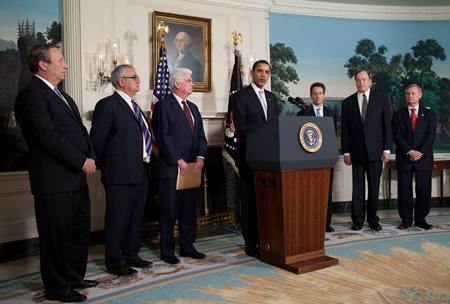 White House photo 2/25/09 by Pete SouzaIt's clear that a lot of factors led us into this economic crisis, but one of the biggest was that our economy was left exposed by regulations that were out of date and regulators who weren't minding the store.President Obama today took that problem head on by laying out 7 key principles for transforming the nation's regulatory system. We must:
White House photo 2/25/09 by Pete SouzaIt's clear that a lot of factors led us into this economic crisis, but one of the biggest was that our economy was left exposed by regulations that were out of date and regulators who weren't minding the store.President Obama today took that problem head on by laying out 7 key principles for transforming the nation's regulatory system. We must:- Enforce strict oversight of financial institutions that pose systemic risks
- Strengthen markets so they can withstand both system-wide stress and the failure of one or more large institutions
- Encourage our financial system to be open and transparent, and to speak in plain language investors can understand
- supervise financial products based on "actual data on how actual people make financial decisions"
- Hold market players accountable, starting at the top
- Overhaul our regulations so they are comprehensive and free of gaps
- Recognize that the challenges we face are global
"I have the utmost confidence that if these outstanding public servants standing beside me are working in concert, if we all do our jobs, if we once again guide the market's invisible hand with a higher principle, our markets will recover," the President said, standing alongside his economic team. "Our economy will once again thrive, and America will once again lead the world in this new century as it did in the last."He also had some strong words for people who have been misrepresenting this plan:Let me be clear: The choice we face is not between some oppressive government-run economy or a chaotic and unforgiving capitalism. Rather, strong financial markets require clear rules of the road, not to hinder financial institutions, but to protect consumers and investors, and ultimately to keep those financial institutions strong. Not to stifle, but to advance competition, growth and prosperity. And not just to manage crises, but to prevent crises from happening in the first place, by restoring accountability, transparency and trust in our financial markets. These must be the goals of a 21st century regulatory framework that we seek to create. -
The first dollars from the American Recovery and Reinvestment Act are headed out the door today, as the federal government makes $15 billion available to help states shore up their Medicaid funds.And there's more coming up.Just a week after President Obama signed the Act into law, the Department of Housing and Urban Development (HUD) today allocated 75% of its recovery funds -- $10 billion -- to create green jobs, to revive housing markets with high rates of foreclosure, and curb homelessness."Recovery Act investments in HUD programs will be not just swift, but also effective," HUD Secretary Shaun Donovan said in a statement. "They will generate tens of thousands of jobs, help the families and communities hardest hit by the economic crisis, and modernize homes to make them energy efficient."The money opened up today includes:$3 billion to develop, finance, and modernize public housing; $255 million for Native American and Native Hawaiian Housing; nearly $100 million for lead hazard reduction; $2.25 billion to kick-start the production of stalled affordable rental housing projects under the Tax Credit Assistance Program (TCAP); $2 billion to undertake much-needed project improvements to maintain the quality of critical affordable housing; $1 billion to rehabilitate affordable housing and improve key public facilities under the Community Development Block Grant Program; $1.5 billion to reduce homelessness, and prevent it among those facing a sudden economic crisis; and a temporary increase to the loan limits of mortgages insured by the Federal Housing Administration (FHA).
-
One thing you will continue to hear a lot about out of the Obama Administration is green jobs, fulfilling a vision that has been developed around the country for years – we asked Greg Nelson of the Office of Public Liaison to give us an overview of what’s going on right now.One of the centerpieces of President Obama's agenda has been fulfilling the promise of green jobs -- creating opportunities for the broadest range of Americans to participate in creating a new energy economy, while building a career that will support healthy families and communities. As the member of the Public Liaison team charged with reaching out to the environmental community, I’ve seen the level of excitement over this as something that used to seem like a fantasy becomes a top national priority. And as green jobs visionary Van Jones said at a conference this weekend, the green jobs element of the recovery package is also one of the most fiscally responsible in terms of bang for the buck: "Every dollar spent on green jobs is going to be out there working double-time, triple-time."It is shaping up to be a great week for making that promise a reality for even more Americans. Representative Hilda Solis, one of the earliest champions for the power of green jobs -- and the architect and sponsor of the Green Jobs Act -- was confirmed by the Senate yesterday with a strong 80-17 to be our next Secretary of the Department of Labor. She's been a remarkable advocate for developing green jobs by building an economy we can all be proud of, and her voice and vision will be a powerful addition -- the Sierra Club said they were "overjoyed" by the confirmation.At the President's address last night, he discussed how important it is to change the way we create, transport, and use energy. Watching and cheering as a guest of the First Lady was Blake Jones, the CEO of Namaste Solar in Boulder, CO. Blake isn't a green jobs advocate as such, but he and Namaste are at the front lines, creating jobs and opportunity. Because of the American Recovery and Reinvestment Act, Blake and Namaste will be hiring in 2009 instead of laying people off.On Friday, Vice President Biden and a half dozen members of the Cabinet head to Philadelphia for the first meeting of the Middle Class Task Force. The topic? Green jobs, and looking at some of the innovative programs in Philly and PA that are bringing together universities, labor, the community, and sustainable businesses. The task force will produce a report that we'll share broadly and hope will contribute to this momentum.And finally, don't forget to check out the Powershift conference this weekend in DC. 10,000 youth organizers talking about climate and green jobs.It is a good week for green jobs.
-
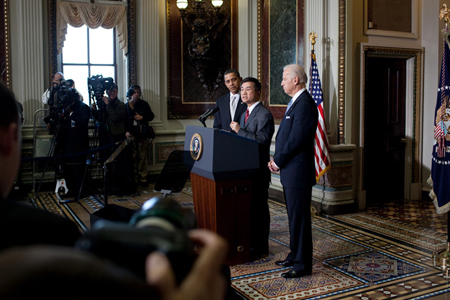 White House photo 2/25/09 by Pete Souza"Gary knows the American Dream. He's lived it. And that's why he shares my commitment to do whatever it takes to keep it alive in our time," President Obama said this morning in announcing former Washington governor Gary Locke as his choice to lead the Commerce Department."It is the task of the Department of Commerce to help create conditions in which our workers can prosper, our businesses can thrive, and our economy can grow," he said. "That's what Gary did in Washington state, convincing businesses to set up shop and create the jobs of the 21st century -- jobs in science and technology; agriculture and energy -- jobs that pay well and can't be shipped overseas. That's what he did by establishing favorable markets abroad where Washington state's businesses could sell their products. That's what he did by unleashing powerful partnerships between state and local governments, between labor and business -- all with an eye toward prosperity and progress for all those in his state who had dreams of their own.""The Department of Commerce plays a critical role in nurturing innovation, expanding global markets, protecting and managing our ocean fisheries, and fostering economic growth," Secretary-designate Locke said. "The Department of Commerce can and will help create the jobs and the economic vitality our nation needs."He told the story of his family's journey to the United States and their struggle for success, and offered it is an example of American ingenuity and determination."My family's story is America's story," Locke said. "Our story is just one of hundreds of millions since the birth of our nation, of people coming from every part of the world in pursuit of the American Dream of freedom, hope and opportunity. In hard times, Americans have rallied together, sacrificed and even given their lives for our country, because they believe in the essential goodness and promise of America."
White House photo 2/25/09 by Pete Souza"Gary knows the American Dream. He's lived it. And that's why he shares my commitment to do whatever it takes to keep it alive in our time," President Obama said this morning in announcing former Washington governor Gary Locke as his choice to lead the Commerce Department."It is the task of the Department of Commerce to help create conditions in which our workers can prosper, our businesses can thrive, and our economy can grow," he said. "That's what Gary did in Washington state, convincing businesses to set up shop and create the jobs of the 21st century -- jobs in science and technology; agriculture and energy -- jobs that pay well and can't be shipped overseas. That's what he did by establishing favorable markets abroad where Washington state's businesses could sell their products. That's what he did by unleashing powerful partnerships between state and local governments, between labor and business -- all with an eye toward prosperity and progress for all those in his state who had dreams of their own.""The Department of Commerce plays a critical role in nurturing innovation, expanding global markets, protecting and managing our ocean fisheries, and fostering economic growth," Secretary-designate Locke said. "The Department of Commerce can and will help create the jobs and the economic vitality our nation needs."He told the story of his family's journey to the United States and their struggle for success, and offered it is an example of American ingenuity and determination."My family's story is America's story," Locke said. "Our story is just one of hundreds of millions since the birth of our nation, of people coming from every part of the world in pursuit of the American Dream of freedom, hope and opportunity. In hard times, Americans have rallied together, sacrificed and even given their lives for our country, because they believe in the essential goodness and promise of America." -
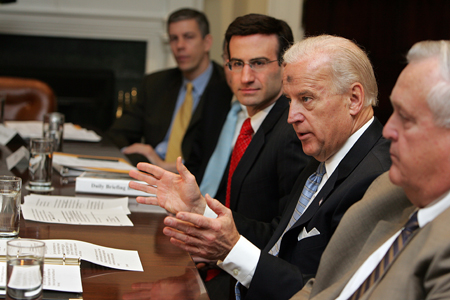
White House photo 2/25/09 by Sharon Farmer"They said last night don't mess with Joe," the Vice President said today (Ash Wednesday) at the first Recovery Plan Implementation meeting. Then, pointing to his left, he corrected that perception: "This is the guy you don't mess with."He's talking about Earl Devaney, announced this week as the choice to lead the Recovery Act Transparency and Accountability Board."The President has appointed one of our toughest Inspector Generals -- he's a no-nonsense guy -- to help us follow the money," the Vice President said.A former Secret Service agent best known for his record of rooting out corruption as an Inspector General (IG) at the Interior Department, Devaney said it's not enough just to detect fraud and waste -- we've got to prevent it before the fact."I'll be on the frontlines, alongside the department IGs, preventing that waste," he said. And once the money starts to go out and Recovery.gov has all sorts of data, he said, he's counting on everyday Americans to take the initiative and keep an eye on the government, too.There will be regular Recovery Plan Implementation meetings in the weeks and months ahead, so the Vice President can get regular updates from department and agency leaders – to hear what’s working and what isn’t.Other key quotes from the meeting:Vice President Biden:"This is a monumental project, but it's doable...It's about getting the money out in 18 months, to literally dropkick us out of this recession.""The fact that so many Americans are struggling to get by should be an incentive to make sure the money is spent well."Office of Management and Budget Director Peter Orszag:"We are asking the taxpayers for their help to get this country out of this recession, and in return they deserve accountability and transparency. We have to go beyond normal procedure to a higher level of reporting." -
We’ve been seeing a lot of excitement about the dramatic change in environmental priorities in the executive branch, most recently about the consensus to develop a new international agreement on mercury. We asked Nancy Sutley, Chair of the White House Council on Environmental Quality, to give us her thoughts.
As the President’s environmental advisor, I help develop policies, set priorities, and coordinate the efforts of the many agencies and departments of the Federal Government. Across the country, Americans have shown that they are eager to see improvements when it comes to the environment and the President has made it clear that he plans to make a lot of progress on this issue.
It is hard to miss the significance of the fact that one month to the day after the President was inaugurated, the United States led an effort to secure international consensus on the fact that we must take immediate action to reduce mercury emissions across the globe. This agreement between the United States and 40 other countries marks a major step forward in protecting human health and the environment from mercury, which can improve the lives of woman and children throughout the world.
I’m extremely proud that under the President’s leadership, we are taking a leading role in working with other nations to craft this global, legally binding agreement. I thought Achim Steiner, executive director of the U.N. Environmental Program, captured the moment speaking to the Washington Post: "Only a few weeks ago, nations remained divided on how to deal with this major public health threat which touches everyone in every country of the world... Today, the world's environment ministers, armed with the full facts and full choices, decided the time for talking was over -- the time for action on this pollution is now."
The President said he wanted to protect our children from health hazards and developmental disabilities caused by environmental toxins. This commitment to reducing mercury emissions is a step in the right direction for future generations around the globe. As a side note, I also just wanted to say how exciting it is to be able to discuss this, and I am looking forward to seeing all of the wonderful things to come from the new whitehouse.gov.
-
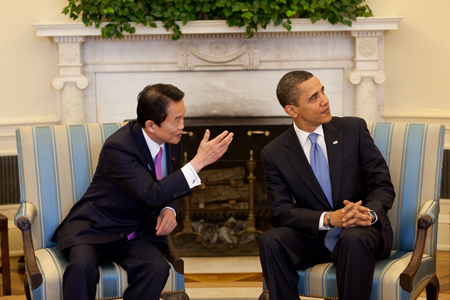
The leaders of the world's two largest economies met in Washington yesterday morning, as Japanese Prime Minister Taro Aso became the first foreign leader to meet with the President in the Oval Office.
"The alliance that we have is the cornerstone of security in East Asia," President Obama said before the meeting. "It's one that my administration wants to strengthen. We think that we have an opportunity to work together not only on issues related to the Pacific Rim but throughout the world, and Japan has been a great partner on issues ranging from climate change to Afghanistan."
Japan was also the first stop on Secretary of State Hillary Clinton's first foreign trip, earlier this month.
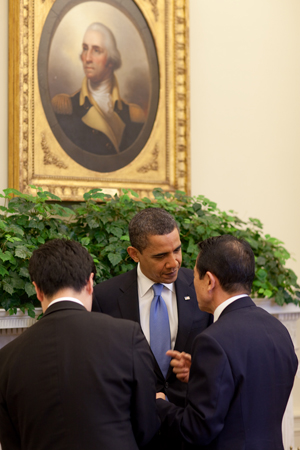
White House photos 2/24/09 by Pete Souza -
UDPATE 3: TranslationsExcerpts of last night's address are now available in Arabic, Bahasa, Chinese, Farsi, French, Russian, and Swahili.
UPDATE 2: Video.
UPDATE: Read the President's full remarks, in English or en español.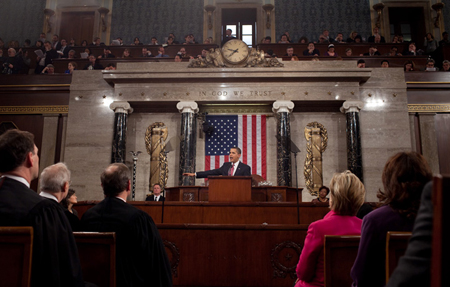 White House photo 2/24/09 by Pete Souza
White House photo 2/24/09 by Pete Souza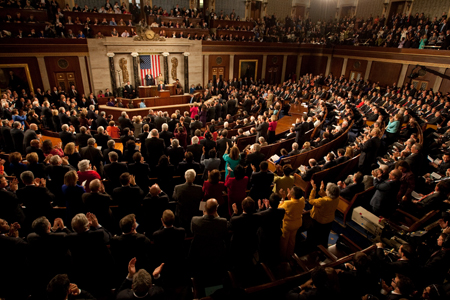 White House photo 2/24/09 by Joyce N. Boghosian
White House photo 2/24/09 by Joyce N. Boghosian
The President is gearing up to give his first address to a joint session of Congress tonight (it's not technically a State of the Union, since it's the first year of his administration).Read an excerpt of his address below, and see the names of the Americans who will be seated in the First Lady’s box during the President’s remarks.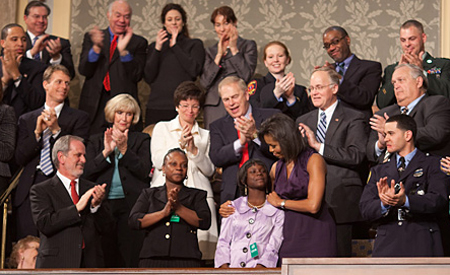 White House photo 2/24/09 by Pete SouzaExcerpts:
White House photo 2/24/09 by Pete SouzaExcerpts:
While our economy may be weakened and our confidence shaken; though we are living through difficult and uncertain times, tonight I want every American to know this: We will rebuild, we will recover, and the United States of America will emerge stronger than before."The weight of this crisis will not determine the destiny of this nation. The answers to our problems don’t lie beyond our reach. They exist in our laboratories and universities; in our fields and our factories; in the imaginations of our entrepreneurs and the pride of the hardest-working people on Earth. Those qualities that have made America the greatest force of progress and prosperity in human history we still possess in ample measure. What is required now is for this country to pull together, confront boldly the challenges we face, and take responsibility for our future once more.
We have lived through an era where too often, short-term gains were prized over long-term prosperity; where we failed to look beyond the next payment, the next quarter, or the next election. A surplus became an excuse to transfer wealth to the wealthy instead of an opportunity to invest in our future. Regulations were gutted for the sake of a quick profit at the expense of a healthy market. People bought homes they knew they couldn’t afford from banks and lenders who pushed those bad loans anyway. And all the while, critical debates and difficult decisions were put off for some other time on some other day.Well that day of reckoning has arrived, and the time to take charge of our future is here.Now is the time to act boldly and wisely – to not only revive this economy, but to build a new foundation for lasting prosperity. Now is the time to jumpstart job creation, re-start lending, and invest in areas like energy, health care, and education that will grow our economy, even as we make hard choices to bring our deficit down. That is what my economic agenda is designed to do, and that’s what I’d like to talk to you about tonight.
The recovery plan and the financial stability plan are the immediate steps we’re taking to revive our economy in the short-term. But the only way to fully restore America’s economic strength is to make the long-term investments that will lead to new jobs, new industries, and a renewed ability to compete with the rest of the world. The only way this century will be another American century is if we confront at last the price of our dependence on oil and the high cost of health care; the schools that aren’t preparing our children and the mountain of debt they stand to inherit. That is our responsibility.In the next few days, I will submit a budget to Congress. So often, we have come to view these documents as simply numbers on a page or laundry lists of programs. I see this document differently. I see it as a vision for America – as a blueprint for our future.My budget does not attempt to solve every problem or address every issue. It reflects the stark reality of what we’ve inherited – a trillion dollar deficit, a financial crisis, and a costly recession.Given these realities, everyone in this chamber – Democrats and Republicans – will have to sacrifice some worthy priorities for which there are no dollars. And that includes me.But that does not mean we can afford to ignore our long-term challenges. I reject the view that says our problems will simply take care of themselves; that says government has no role in laying the foundation for our common prosperity.
Yesterday, I held a fiscal summit where I pledged to cut the deficit in half by the end of my first term in office. My administration has also begun to go line by line through the federal budget in order to eliminate wasteful and ineffective programs. As you can imagine, this is a process that will take some time. But we’re starting with the biggest lines. We have already identified two trillion dollars in savings over the next decade.In this budget, we will end education programs that don’t work and end direct payments to large agribusinesses that don’t need them. We’ll eliminate the no-bid contracts that have wasted billions in Iraq, and reform our defense budget so that we’re not paying for Cold War-era weapons systems we don’t use. We will root out the waste, fraud, and abuse in our Medicare program that doesn’t make our seniors any healthier, and we will restore a sense of fairness and balance to our tax code by finally ending the tax breaks for corporations that ship our jobs overseas.
I know that we haven’t agreed on every issue thus far, and there are surely times in the future when we will part ways. But I also know that every American who is sitting here tonight loves this country and wants it to succeed. That must be the starting point for every debate we have in the coming months, and where we return after those debates are done. That is the foundation on which the American people expect us to build common ground.
But in my life, I have also learned that hope is found in unlikely places; that inspiration often comes not from those with the most power or celebrity, but from the dreams and aspirations of Americans who are anything but ordinary.I think about Leonard Abess, the bank president from Miami who reportedly cashed out of his company, took a $60 million bonus, and gave it out to all 399 people who worked for him, plus another 72 who used to work for him. He didn’t tell anyone, but when the local newspaper found out, he simply said, ''I knew some of these people since I was 7 years old. I didn't feel right getting the money myself."I think about Greensburg, Kansas, a town that was completely destroyed by a tornado, but is being rebuilt by its residents as a global example of how clean energy can power an entire community – how it can bring jobs and businesses to a place where piles of bricks and rubble once lay. "The tragedy was terrible," said one of the men who helped them rebuild. "But the folks here know that it also provided an incredible opportunity."And I think about Ty’Sheoma Bethea, the young girl from that school I visited in Dillon, South Carolina – a place where the ceilings leak, the paint peels off the walls, and they have to stop teaching six times a day because the train barrels by their classroom. She has been told that her school is hopeless, but the other day after class she went to the public library and typed up a letter to the people sitting in this room. She even asked her principal for the money to buy a stamp. The letter asks us for help, and says, "We are just students trying to become lawyers, doctors, congressmen like yourself and one day president, so we can make a change to not just the state of South Carolina but also the world. We are not quitters. -
If you subscribe to our RSS feed, you may have noticed a little hiccup recently having to do with multiple posts showing up in your feed reader. We've now corrected that problem and moving forward, it should be fine. If for some reason it continues for you please contact us.
If you don't currently subscribe to WhiteHouse.gov content via RSS, take a look below at the options we offer -- which include feeds for the blog, press office, and photo galleries, as well as podcast subscriptions.
(Or, learn more about RSS feeds.)
RSS News Feeds
White House.gov Blog Feed
White House.gov Press Office Feed
White House.gov Photo Gallery FeedPodcasts
President Obama’s Weekly Address and Key Speeches (Video)
President Obama’s Weekly Address and Key Speeches (Audio)
Best of White House Video
Watch all the musical acts








